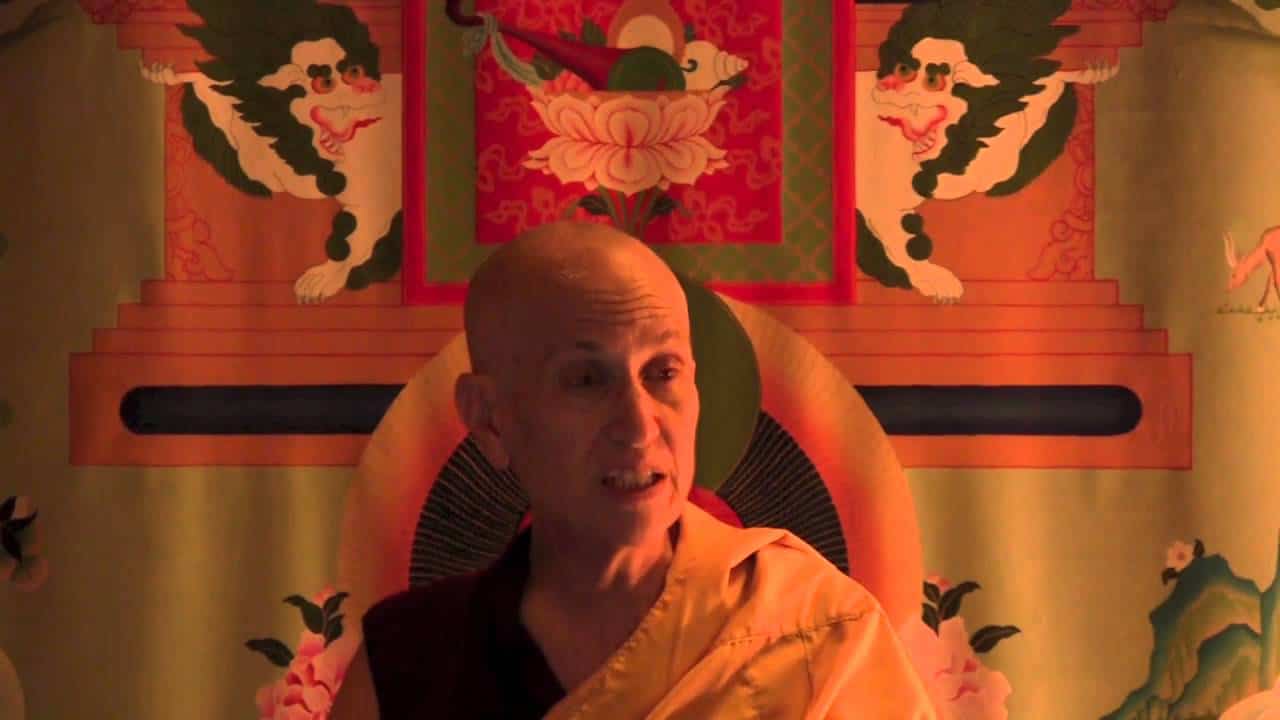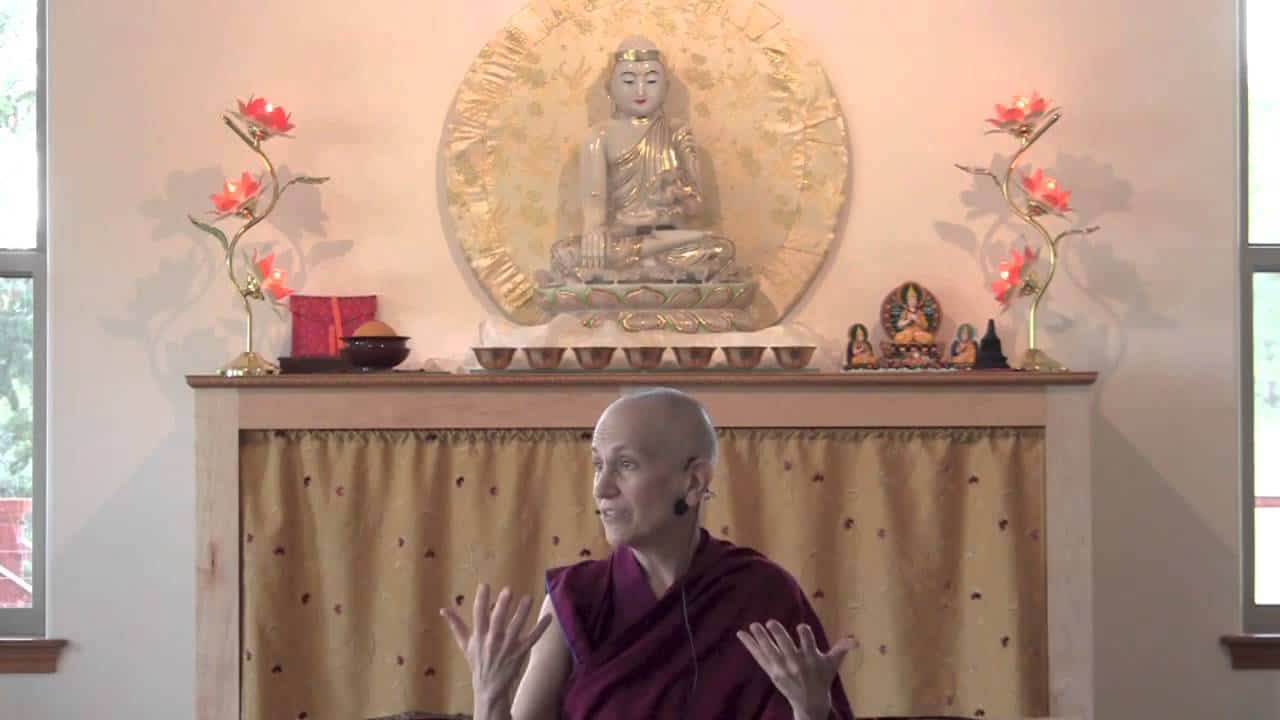The middle way
The final talk in a series on verses from Nagarjuna given during the 2015 Manjushri retreat, these verses are from Treatise on the Middle Way.
- Different types of dependence
- Causal dependence as the reason to prove emptiness
- Emptiness also is a dependent designation
- Importance of understanding the meaning of “emptiness”
The last two verses that His Holiness asked us to recite daily are two from the Karikas. The text is called The Treatise on the Middle Way, or, Root Wisdom, Fundamental Wisdom. There are several different ways the title is translated. But it’s [Nagarjuna’s] major text on emptiness. So these two verses are very famous. Actually, Geshe … when he was here several years ago, asked us to memorize them. And I started to try and develop a chant with them but then I stopped for some reason.
Anyway, so the first one is,
That which is dependent arising is explained to be emptiness.
That being a dependent arising is itself the middle way.
So, the first line: “That which is dependent arising is explained to be emptiness.” There the way Lama Tsongkhapa described it is “that which is dependent arising” is referring to causal dependence.
Because there are different types of dependence, remember? Causal dependence, mutual dependence (which includes the dependence of wholes and parts on each other), and then dependent designation. So we start out understanding causal dependence—that’s the one that’s much easier—and use that as the reason to prove emptiness. So in a syllogism you might say “the person is empty of inherent existence because of arising due to causes.”
That one always kind of shocks me because it’s like, oh, I arose due to causes? That means I wouldn’t be here without the causes. Then something inside me says, no, that’s not right. I’m going to be here anyway! You know? I didn’t come out of causes. I’m not going to disappear because of the nature of impermanence. I’m here! Yes?
So just thinking about causal dependence already, you can see, begins to shake our feeling of being some kind of independent being. So he’s saying here that all the things that are dependent on causes and conditions (in other words all impermanent, functioning things) are explained to be empty. They’re empty of inherent existence.
And remember we just talked about the previous verse, that because things (when I say thinks it mean functional things) because they’re empty…. Because permanent things depend on these functioning things. If the functioning things don’t have an inherent nature then the permanent things that depend on them also can’t have any kind of inherent nature.
Then the last two lines it says, “That being a dependent arising is itself the middle way.” “That being a dependent designation.” There are different ways of taking that. One is that something that is causally dependent is also a dependent designation. So if you think deep enough about causal dependence you eventually get to dependent designation, which is much more difficult to understand.
Another interpretation is that “that” refers to emptiness itself. So emptiness itself is a dependent designation. Emptiness itself doesn’t exist inherently. It depends on its parts, it depends on its basis of designation, it depends on the conventionalities that it is the ultimate nature of. So that itself is the middle way. So when we’re talking about “middle way” it’s emptiness of inherent existence on one hand and dependent arising (specifically dependent designation) on the other hand.
[In response to audience] Yes, emptiness has parts. Because if say “emptiness” in general it depends on the emptiness of the table, the emptiness of the rug, the emptiness of people. So all of those are types of emptiness. They’re the parts of the emptiness.
[In response to audience] If you think emptiness means non-existence then you haven’t understood emptiness correctly. It’s a wrong consciousness. You’ve made up your own meaning of emptiness. Which is why it’s very important to actually study the meaning of emptiness Because it’s just too easy for us to make up our own definition and then go astray. It’s not just you sit here and empty your mind and that’s emptiness. Or you don’t think about anything. Or you say, oh nothing exists. Or you say, oh there’s no good, there’s no bad. You know? None of that is the meaning of emptiness. But so often if we just hear words without studying the meaning of the words then we get all sorts of wrong ideas. So that’s why all these great masters wrote all these texts. If it weren’t important they had no need to sit around and write volumes of texts explaining emptiness.
[In response to audience] The basis of designation of emptiness is the lack of inherent existence. That base upon which emptiness depends are all the phenomena, because it is the ultimate nature of those phenomena. So don’t confuse base with basis of designation.
Basis of designation is the lack of inherent existence. But emptiness depends on there being conventionally existent things that are empty of inherent existence. Without those conventionally existent things you couldn’t have their emptiness. So they’re called the “base” of emptiness. But they’re not the basis of designation of emptiness. Okay?
Then the next line says,
There does not exist anything
that is not dependently arisen.
Therefore there does not exist anything
that is not empty.
And that is so succinct and to the point. There doesn’t exist anything whatsoever that is not dependently arisen. So even emptiness itself arises dependently. Emptiness is not some kind of absolute. Emptiness has the same existential status as everything else in that it exists conventionally and it’s empty of inherent existence. The difference between emptiness and all the other phenomena is that emptiness exists the way it appears to the principal mind that realizes it. Whereas all the other conventionalities do not exist as they appear to the principal mind that realizes it because they appear truly existent even though they aren’t. Okay?
There’s also been this tendency for people to reify emptiness and make it some kind of absolute–which is why I disagree with the translation “absolute truth.” Because we think of something that’s “absolute” as out there independent of everything. Whereas the word “ultimate truth” I think is a better translation because it means the final truth. When you search for something’s mode of being what’s the final thing you come up with is its emptiness. So don’t think of emptiness itself as something inherently existent and absolute and independent.
“So therefore there does not exist anything that is not empty.” Since everything arises dependently. And here “arise” doesn’t mean “is produced.” Because permanent phenomena aren’t produced. Here “arises” just means “exists.” So since everything exists dependently, then everything is empty. “Therefore there does not exist anything that is not empty.” So since everything is dependent, everything’s empty. So then you can’t point to something that is dependent that isn’t empty, and you can’t point to something that is empty that isn’t dependent.
Again, when they talk about emptiness and dependent arising coming to the same point, that’s what it’s getting at. Everything’s empty, everything also exists dependently. And those two things can’t be separated out. And it’s not like things first had dependency and then became empty, or first had emptiness and then became dependent. it’s just in their very nature they are both dependent and empty. And then the trick is– We usually use dependence as a reason to prove emptiness, but when you come out of the meditation on emptiness then you have to use the understanding of emptiness to see how things do exist dependently.
Okay. So let’s do it. [laughter]
[in response to audience] Why? You don’t want to be happy? Realizing emptiness is the path to happiness.
Venerable Thubten Chodron
Venerable Chodron emphasizes the practical application of Buddha’s teachings in our daily lives and is especially skilled at explaining them in ways easily understood and practiced by Westerners. She is well known for her warm, humorous, and lucid teachings. She was ordained as a Buddhist nun in 1977 by Kyabje Ling Rinpoche in Dharamsala, India, and in 1986 she received bhikshuni (full) ordination in Taiwan. Read her full bio.


